From ponds to plates: The enhancement of nutrition through fish consumption in Bihar, India
by Puneet Khanduja, Dr. Baishnaba Charan Ratha, Manmohan Singh and Dipanshi Sood
Apr 22, 2024
6 min
Bihar’s ponds offer a unique solution to its nutritional challenges, supporting small-scale fisheries to improve livelihoods and combat malnutrition. World Fish and MSC, in collaboration with the Govt. of Bihar, empower women-led fish-producing groups (FPGs) to enhance their economic prospects and increase nutrition intake. The initiative includes adopting innovative strategies such as pond-based livelihoods and engaging in social behavior change (SBCC) activities to improve dietary diversity, address malnutrition, and improve nutrition outcomes for the state.
Highlights
- Bihar’s ponds offer a unique solution to malnutrition: The provision of support to small-scale fisheries for economic growth and enhanced food security;
- World Fish and MSC empower women-led fish-producing groups (WFPGs) in partnership with the Bihar government. They address the supply and demand sides for sustainable nutrition;
- Innovative strategies include pond-based livelihoods and engagement in social behavior change (SBCC) activities to improve dietary diversity, address malnutrition, and improve nutrition outcomes for the state.
Introduction
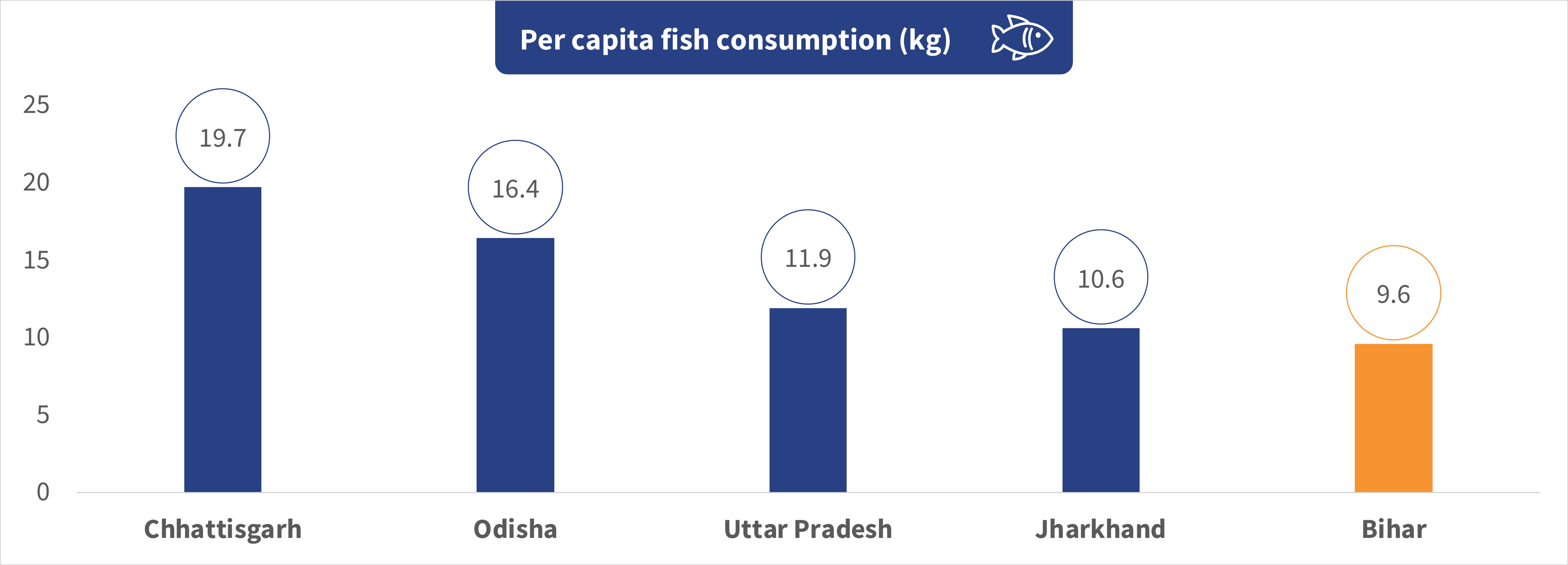
The Indian state of Bihar has a distinctive advantage when it comes to ways to address its nutrition challenges: its ponds. The state is dotted with water bodies that can help develop small-scale fisheries—a promising strategy to improve livelihoods, combat malnutrition, and enhance food security. The state envisions a holistic development model that uses its aquatic ecosystems for economic growth and social well-being. The ponds provide a unique opportunity to make routine fish consumption more accessible and affordable for people in the communities associated with WFPGs in Bihar. Currently, the state’s fish consumption falls notably below the international and national averages.
As per the Organization for Economic Cooperation and Development (OECD) and the Food and Agriculture Organization’s (FAO) 2019-20 estimate, the global per capita fish consumption is 20.5 kg, whereas Bihar records a mere 9.6 kg per capita. This disparity extends beyond international standards to compare unfavorably with peer states in India, which include Jharkhand, Odisha, Uttar Pradesh, and Chhattisgarh. This lower-than-average consumption is significant if we consider the nutritional powerhouse that fish represents—it is rich in high-quality protein, omega-3 fatty acids, and essential vitamins and minerals.
Although the state has made significant progress to reduce malnutrition, it still grapples with high levels of undernourishment and micronutrient deficiencies. Stunting affects a staggering 42.9% of children under five, which surpasses the national average. Additionally, 41% of Bihar’s children experience underweight issues. Anemia is prevalent, which affects 69.4% of children and 63.5% of women in the 15-49 age group. This indicates widespread health concerns. Paradoxically, 2.4% of children under five and 15.9% of women face obesity issues. These statistics underscore the urgent need to address Bihar’s nutritional deficiencies.
World Fish and MSC have been providing technical support to empower FPGs in collaboration with the Bihar government’s Bihar Rural Livelihood Promotion Society—JEEViKA. This presents a promising pathway. These efforts enhance economic prospects and are key to mitigate Bihar’s persistent nutritional challenges. The state’s proactive approach to promote fisheries aligns with the imperative need to counteract the multifaceted nutritional concerns, which ensures a healthier future for its communities.
Fish’s role in better health outcomes
In Bihar, the integration of fish into dietary habits is a significant avenue to improve nutritional intake, especially for adolescent girls, pregnant women, and young children. However, we identified various challenges through our interactions with the region’s WFPGs. These include limited access to fresh fish due to limited availability, cost, nutrition literacy, and cultural beliefs. A senior FPG member said, “Small children cannot eat fish due to sharp bones present in it. Moreover, till the time the child’s head is not shaved (tonsuring ceremony), the mother is not allowed to eat any non-vegetarian food items.”
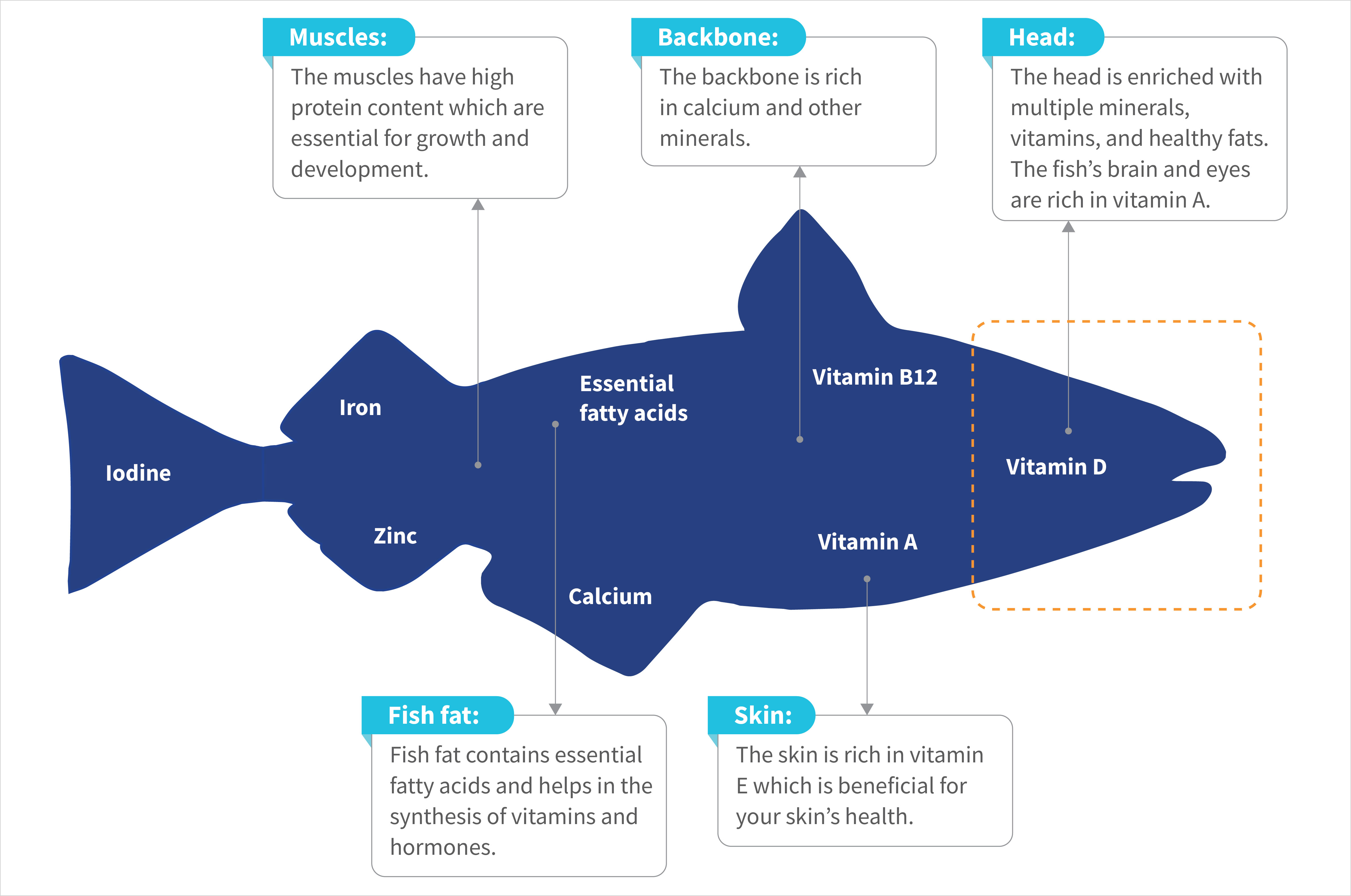
We developed a comprehensive strategy that addresses both the supply and demand sides of the nutritional equation. Our initiative recognizes the multifaceted nature of nutritional challenges in our collaboration with the Bihar government. This holistic approach boosts fish availability through the activities of fisheries. It also delves into the intricate fabric of nutritional literacy and cultural dynamics. We intend to foster a sustainable and impactful nutritional transformation in Bihar through engagements with WFPGs and the creation of a cadre of “Matasya Sakhis” for support.
We have achieved substantial progress on the supply side through fisheries activities in 118 ponds across 112 village organizations. The JSPVAT fisheries teams extended technical support to each FPG. This encompasses crucial aspects, such as pond maintenance, polyculture, the introduction of small fish (mola), and the establishment of linkages with markets. This comprehensive approach has created livelihood opportunities for approximately 80,000 households and reduced the farming period in intervention ponds to four months from a year. This has allowed for two to three additional farming cycles annually. More than 200 individuals have received training. 142 have successfully established themselves as fish vendors in nearby markets, which further contributed to the local economy.
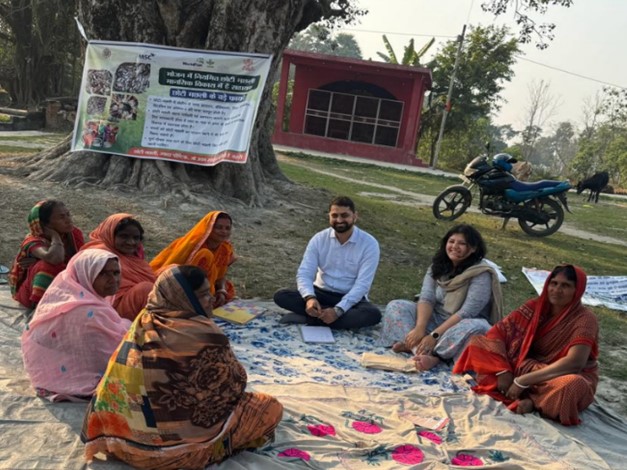
Simultaneously, our innovative strategies on the demand side intend to revolutionize nutritional awareness. Initiatives include SBCC activities, such as the creation of engaging puppet videos tailored for children and recipe videos that offer step-by-step guidance on the preparation of fish powder and paste for safe consumption by children, among others. JVSPAT Fisheries team provides periodic training on nutrition education to WFPG members and their families. This has led to a notable 10% rise in fish consumption within WFPG families.
These dynamic endeavors complement the supply-side progress, which fosters a culture of informed nutritional choices within the communities we serve. Moreover, our commitment to nutrition literacy extends to impactful residential training programs for “Matasya Sakhis.” This specialized cadre plays a pivotal role to support FPGs on both supply and demand aspects. The training sessions cover a spectrum of elements, which range from technical intricacies and gender perspectives to comprehensive insights into nutrition. The sessions emphasize the significance of a balanced diet, the importance of food diversity, and the inclusion of small fish, such as pothia and mola, among others. These trained individuals become key facilitators to disseminate nutritional knowledge within their communities.
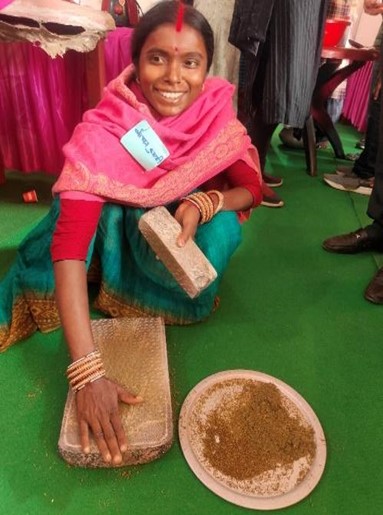
Way forward
Our program envisions a deeper geographic expansion, which extends into districts, such as Nalanda and Madhubani. It targets areas with a greater density of ponds and elevated malnutrition prevalence. The extension of our successful fisheries activities will deepen our impact and empower communities with sustainable livelihood opportunities and access to nutritious fish. Simultaneously, community engagement programs will be pivotal in addressing cultural barriers, dispel myths, and promote the nutritional benefits of fish consumption. This targeted awareness campaign seeks to instigate a positive shift in community attitudes toward fish as a valuable dietary component.
Our focus remains on the expansion of the Matasya Sakhi program to scale up our impact. It would create a larger cadre equipped with the knowledge to support WFPGs on the supply and demand sides. The use of technology will be crucial to integrate digital solutions, such as mobile applications or SMS-based platforms. It would provide real-time information and support to FPGs and community members. This digitally adept approach ensures a continuous learning environment and enhances our ability to disseminate nutritional knowledge effectively.
Furthermore, our strategy aligns with broader agricultural, food security, and social safety net programs. We intend to create collaborations that amplify our efforts’ impact through the integration of our initiatives into these existing frameworks. Collaboration with policymakers will advocate for supportive policies within the fisheries sector and strive to integrate nutrition-focused strategies into broader agricultural and economic development policies. This inclusive approach fosters an environment conducive to sustained positive change. It addresses malnutrition comprehensively and creates a lasting impact on the well-being of Bihar’s communities.
Written by

Puneet Khanduja
Senior Manager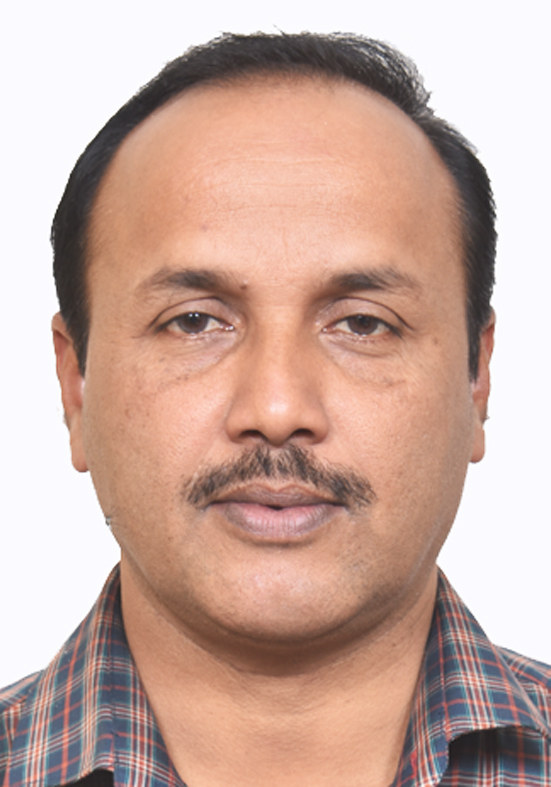
Dr. Baishnaba Charan Ratha
Senior Specialist, WorldFish India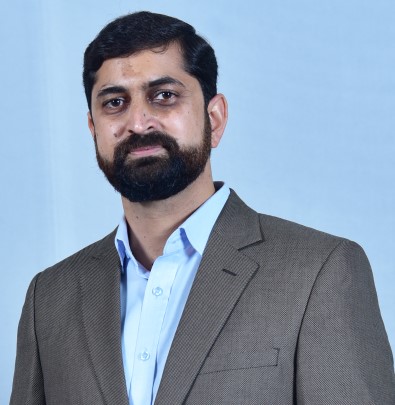
Manmohan Singh
Manager
 by
by  Apr 22, 2024
Apr 22, 2024 6 min
6 min
Leave comments